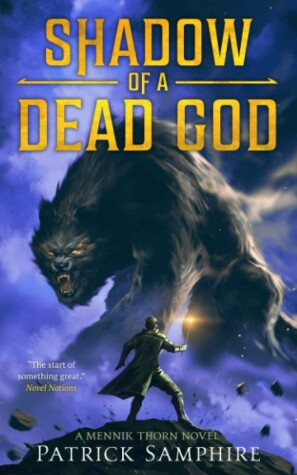“People tend to say as little as possible to the Ash Guard — well, smart people; not you, obviously — and when they do answer, they lie more often than not, even when they’re innocent.”
Mennik is, to put it indelicately, a screw-up. He’s not great as a mage, and as an investigator, well, he sucks. He stumbles on most of his leads by accident and does a lot more running away and getting beaten up than actual fighting. He fully admits – and embraces – that he’s a second-rate mage, but rather than doing the usual thing and just worker bee-ing it away as a cog in the machine for one of the high mages, he’s set off on his own, where he does such exciting work as spending the night shoved in a pantry trying to catch a ghost. But while he may be a second-rate everything else, he’s a first rate friend. When he and his best friend Benny are framed for a murder during a heist gone wrong, he knows it’s his responsibility to clear their names. While he’s short on clues, he’s got some “help” in the form of Benny’s murderous tween daughter, Sereh, and Meroi, the captain of the Ash Guard, who are charged with policing magical crimes. Of course, there’s also the three powerful high mages, each of whom has competing interests but who all seem to have it out for Nik.
“There were three ways to make a lot of money in Agatos: politics, crime, and commerce, although some would argue they were basically the same thing.”
I loved the worldbuilding – the history of Agatos, its political structure with the high mages, and all the different gods, goddesses and feasts. The magic system was also interesting, from how Nik’s magic worked to its source. Nik himself was hilarious – the perfect mix of cynical, sarcastic good guy who’s trying to do the right thing and, well, emphasis on the “trying” part. Like many fantasy heroes, he’s got a complicated relationship with his birth family (as well as the uncertain parentage trope), but he’s made up for it with his found family of Benny and Sereh. Unfortunately for Nik, Benny’s got about the same amount of luck as he does, and Sereh is… well, she’s unique. As for negatives, the pacing was a little uneven, but the action scenes were tense (and hilarious). I also found it hard to believe that the captain of the Ash Guard seemed content to let him blunder around the city, but perhaps this is something that’ll be addressed in later books.
Overall, I finished the book satisfied with the ending but wanting more – more of Nik, Benny and Sereh interacting, more about Nik’s sister, and more about Meroi and the Ash Guard. I’m very much looking forward to more in the series!
I received an advance review copy of this book from the author. This does not affect my opinion of the book or the content of my review.
